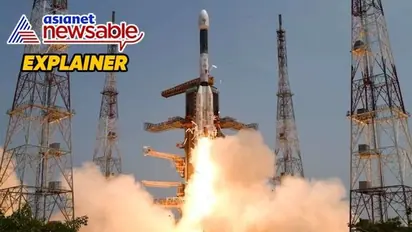Explained: How Modi government is trying to catch up with China in space sector

Synopsis
The Indian government, under PM Narendra Modi, has unveiled new policies to stimulate the country's private space sector, aiming to bolster its competitiveness on the global stage. These regulations seek to streamline processes, encourage foreign investment, and provide clarity for private companies interested in space-related ventures
In a bid to enhance India's private space industry and compete with global counterparts, Prime Minister Narendra Modi's government has announced significant policy changes aimed at encouraging foreign investment in rocket and satellite manufacturing. The move comes as India gears up for national elections expected in April and May.
Pawan Goenka, chairman of the Indian National Space Promotion and Authorization Centre (IN-SPACe), told Bloomberg News that the government is finalizing comprehensive regulations for the burgeoning space sector. These regulations will cover various aspects, including authorization processes, vendor policy, and supply chain management, providing clarity and guidance to local companies.
The Indian Space Research Organisation (ISRO) has traditionally dominated the country's space endeavours. However, the private sector lagged due to limited participation opportunities. Over the past five years, Modi's government has initiated policy changes to open up the space industry to private players.
The new regulations aim to simplify approval processes by streamlining the involvement of government agencies, thereby offering a single-window clearance for companies interested in space-related ventures. AK Bhatt, director general of the Indian Space Association, emphasized the importance of clarity in processes for entering rocket manufacturing and satellite services.
Larsen & Toubro Ltd., in collaboration with state-owned Hindustan Aeronautics Ltd., has already secured a contract to build Polar Satellite Launch Vehicles (PSLVs), marking a significant milestone for private-sector involvement in space projects. The first PSLV with private-sector contributions is set for delivery in mid-2024.
Additionally, Goenka's agency has invited bids from private companies to manufacture the Small Satellite Launch Vehicle, indicating further opportunities for private-sector engagement. Indian space startups, buoyed by significant equity funding, are also making strides in the industry.
While Indian startups like Skyroot Aerospace Pvt Ltd. and Agnikul Cosmos are making promising advancements, they still trail behind their Chinese counterparts in terms of rocket launches. To support these startups, ISRO is working on easing launch bottlenecks by expanding launchpad infrastructure.
The construction of a new launch complex in Kulasekarapattinam, scheduled to open next year, will significantly enhance India's launch capacity. With these developments, India aims to foster a robust private space sector and strengthen its position in the global space race.
Stay updated with all the latest Business News, including market trends, Share Market News, stock updates, taxation, IPOs, banking, finance, real estate, savings, and investments. Track daily Gold Price changes, updates on DA Hike, and the latest developments on the 8th Pay Commission. Get in-depth analysis, expert opinions, and real-time updates to make informed financial decisions. Download the Asianet News Official App from the Android Play Store and iPhone App Store to stay ahead in business.